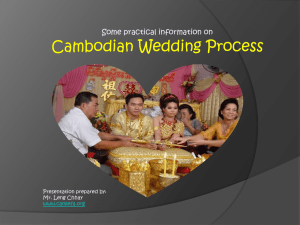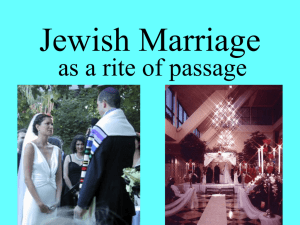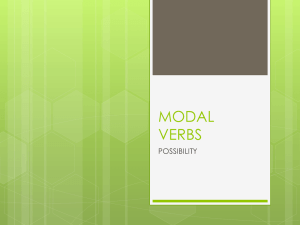Weddings
advertisement
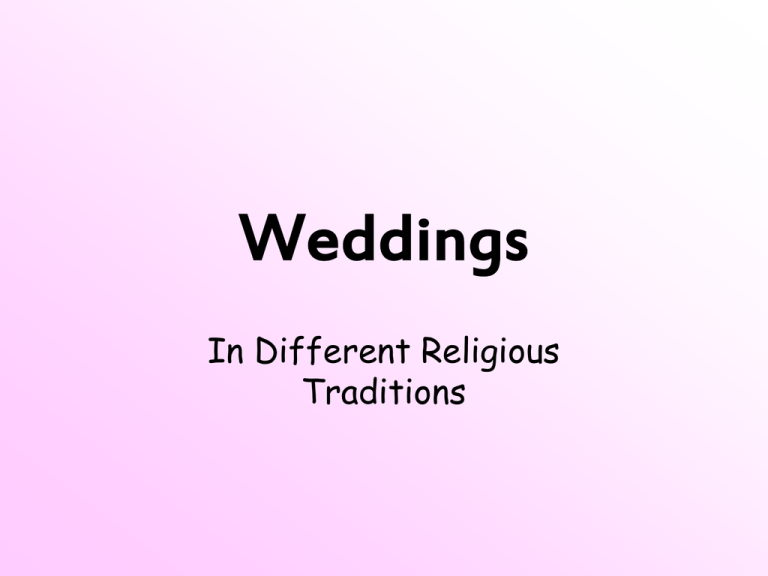
Weddings In Different Religious Traditions Protestant Christian • Marriage is not a sacrament in Protestant churches; it is a religious ritual. • Protestant ceremonies vary according to the denomination – the information following is rather general and does not apply to every church everywhere, but it is rather common to most. • Although it is preferred that the ceremony take place in a church, many Protestant denominations allow weddings to take place elsewhere. There generally will be some restrictions, since this is a religious ceremony. • The ceremony usually lasts about a half an hour (unless Communion is being offered.) • Ceremony includes procession, blessing of rings, prayers, vows. • May include Scripture readings and a sermon. • There is usually at least one vocal piece of music which may or may not include congregational singing. • Many Protestant ceremonies include the lighting of the Unity Candle. Greek Orthodox • An Orthodox wedding is a sacrament and must take place in the church. • The ceremony lasts about an hour The Ceremony: • Ceremony of betrothal – blessing and exchange of rings at the door of the church • Crowning w/ floral crowns (stefania) attached to one another w/ a ribbon to symbolize the glory of God and the unity of the couple • Scripture readings (always The Wedding at Cana from John’s Gospel) • The bride and groom drink from a common cup to remind them of the wedding at Cana • The Dance of Isaiah = the couple walks three times around an altar on which are placed the Gospels and a cross – symbolizing the beginning of their marriage and that Christ is at the center of the marriage The Dance of Isaiah In an Orthodox wedding, the Maid/Matron of Honor is called the Koumbara and the Best Man is the Koumbaro – they have a more active role in the ceremony than the Maid of Honor and Best Man do in Protestant and Catholic weddings. They must both be Orthodox Christians. Jewish Weddings • Jews consider marriage to be a holy institution – the Hebrew word for “wedding” is “kiddushin” = sanctification • Jewish ceremonies usually last about half an hour • There will be some differences in ceremonies that take place in the different branches of Judaism (Orthodox, Reform, etc.) • Men wear a kippah or some other head covering. Whether or not women cover their heads varies, depending upon the branch of Judaism • The witnesses (Maid of Honor and Best Man) must be Jewish and may not be related to the bride and groom. The ceremony takes place anywhere a chuppah (huppah) can be set up – it is a canopy symbolizing the heavens under which all life takes place. Often this will be out of doors The Ceremony. . . • The veiling of the bride by the groom before the ceremony begins • Both the bride and groom are escorted to the chuppah by their parents • The bride walks around the bridegroom 7 times – symbolizes establishing a new home • The betrothal – the groom gives the bride a plain gold ring and says, “Behold, you are betrothed to me with this ring, according to the Law of Moses.” The couple is married at this point. The reading of the ketubah – the marriage contract. This states the obligations the groom has towards the bride. This is signed by the witnesses and given to the bride • The Rabbi pronounces seven blessings over a cup of wine – the cup is then shared by the bride and groom • A glass is placed on the floor and the groom shatters it with his foot – symbolizing that even at times of great joy, Jews remember the sadness in their history Muslim • Marriage is not a religious ritual but a legal contract between the man and woman – therefore it may or may not take place in a mosque • Muslim weddings differ substantially depending upon the nation(s) of origin of the couple The groom is expected to give a substantial gift to his wife on or before the wedding called a mahr – it may be money, property or even the promise to pay for her education. This “gift” is hers to do with as she wishes. The wedding is not valid until this has been given and accepted. The Wedding Ceremony (al-Nikah): • Begins with a sermon by any Muslim male (but will usually be the imam) which invites the couple to live faithful to Muslim beliefs and teachings • Profession of Faith by all there (“There is no god but God. . . .” • Readings from the Qur’an and the Hadith • Concluding prayer • Note that there are no vows or exchange of rings. However, many American and European Muslims incorporate these into their ceremonies. • It is common in many Middle Eastern countries for the bride to not be present at her wedding! (Although she will have witnesses – usually male relatives there – to represent her interests.) Where local law allows, a Muslim man may have up to 4 wives – as long as each is treated equally and respectfully Buddhist • There is no specific wedding ceremony for Buddhists, since Buddhism has traditionally seen marriage as a secular institution • Recently, a ceremony has been developed by a Buddhist institution in Hawaii that is growing in popularity. Buddhist Wedding • Procession • Chanting of prayers from Buddhist texts • Exchange of vows • Exchange of rings • Admonition by priest to couple to follow the teachings of the Buddha and to respect the sanctity of all life • Offering of lights and incense • Reading of the five ways that a husband should minister to his wife are read from the Sigalovada Sutta by The Buddha • Chanting of The Three Refuges and/or The Five Precepts by the couple Hindu • A wedding is a sacrament in Hinduism • Hindu weddings differ depending on where the family is from. • There are often several weeks worth of festivities prior to the actual wedding. • The wedding itself lasts at least two hours; it may last for two days! • A Hindu bride usually wears a red and gold sari and has her hands painted with henna (mehendi); • The groom wears white and has the tikka painted on his forehead • The wedding takes place in a Hindu temple • The wedding ceremony itself: – asks the god of good luck, Ganesha, to bless the marriage – the bride is escorted to the wedding canopy by her uncle and sisters – the bride’s father places her hand into the hand of the groom; then he “washes his hands of her” in water from the Ganges (if possible) • the groom recites various hymns from the Vedas about love and marriage • the wedding fire is lit (sacred to the god Agni) and parched grain is offered by the bride • the bride and groom walk around the fire seven times while asking the gods to bless their marriage and taking vows to one another • the groom places a necklace (or sacred string) on the bride (they do this instead of exchanging rings) and he recites a blessing over her • the ceremony concludes with prayers for the couple • the bride and groom process out with their guests showering them with flower petals and rice • other rituals may be added, depending upon time constraints, the ethnic origin of bride and groom, specific gods/goddesses worshipped by the couple and the wealth of the families What Do Different Religions Allow? Inter-Faith Weddings Catholic Church: • allowed in church and will be considered a sacrament with another Christian • allowed in church but will not be considered a sacrament with a nonChristian • any marriage outside of the Church, without receiving a Dispensation of Form, is considered non-sacramental and invalid Protestant Christians: • generally allowed with all Christians • Some conservative groups do not allow weddings with non-Christians • Note: a few Evangelical and Pentecostal Christian Churches do not consider Catholics to be Christians! Orthodox Christians: • to be a sacrament, a marriage must take place between two members of the Orthodox faith • inter-faith weddings are not allowed in church and are not accepted as valid (sacramental) Jewish • a Jewish wedding is, by definition, a contract between two Jews • Orthodox and Conservative rabbis will not officiate at an inter-faith wedding • some Reform rabbis will officiate, but will not usually concelebrate with clergy of another religion • an inter-faith wedding will not include the signing of the ketubah Islam • traditionally, a Muslim man may marry a Christian or Jewish woman • a Muslim woman may not marry outside the faith • this is changing among Muslims in the U.S. and Europe, where inter-marriage with Christians and Jews is sometimes accepted Hinduism: • accepts that all paths to God are valid • allows marriages between Hindus and members of differing faiths with no restrictions Buddhism: • does not see weddings as a religious ceremony • any marriage that is legal is considered valid In Conclusion • Over 50% of Americans will marry someone whose religious tradition is different from their own • If religion is important to you, it is essential that you understand the rules of both religions before planning your wedding ceremony • If you want a religious ceremony, especially one that incorporates elements from both your faiths, the Unitarian and the Baha’i faiths are open to designing a unique, but meaningful, ceremony • However, such a ceremony will not be considered sacramental by the Catholic Church
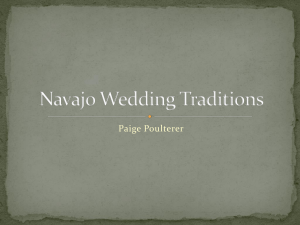


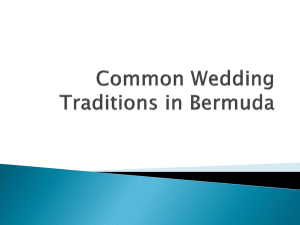
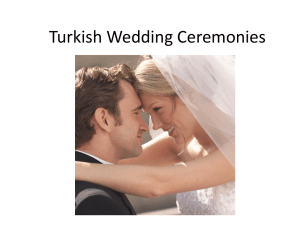
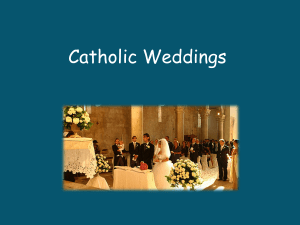
![What do they mean? [KOLA NUT]](http://s2.studylib.net/store/data/005273036_1-7e5e564e9d9071770b510ba51156f003-300x300.png)

